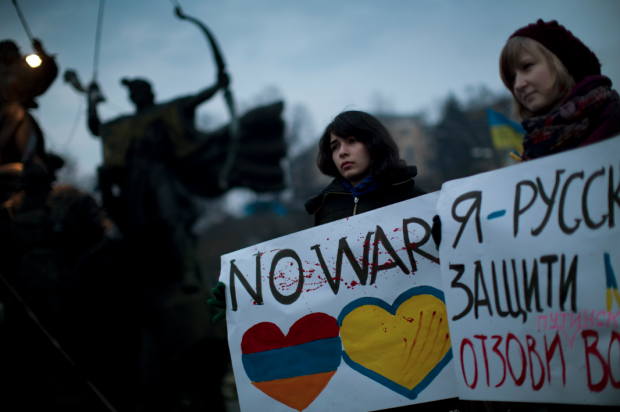
As St. Thomas community members expressed concern for the growing conflict in the east, a possible diplomatic solution in Ukraine emerged Wednesday as top Russian and Western officials tried to defuse one of Europe’s worst crises since the Cold War.
Junior Olga Zamulko was born in Lviv, Ukraine, about 700 miles west of Ukraine’s strategic Crimean peninsula. Russian troops are occupying the peninsula, and the Russian government sees the area as a crucial part of its geopolitical backyard.
“Of course, I’m concerned,” Zamulko said. “It’s devastating to watch the violence and unrest in my home country.”
The European Union prepared a $15 billion aid package for Ukraine, and European and Ukrainian diplomats outlined ways that all sides could step back from the brink of a new global conflict. NATO is taking up the Ukraine situation directly with Russia in an extraordinary meeting of the military alliance originally created as a counterbalance to the Soviet Union on Wednesday in Brussels.
Professor of mathematics Mikhail Shvartsman immigrated from Moscow about 25 years ago, hoping to live in a “freer society.” He said he does not support Russian President Vladimir Putin’s decision to invade Ukraine and that other countries’ lack of engagement allows Putin to gain footing.
“I think that the U.S. kind of missed the bullet a little bit in ‘90s, when Russia was more open to kind of engage all of the resources there,” Shvartsman said. He added that as a result of the U.S. and western Europe’s hands-off approach in dealing with the country after the fall of the Soviet Union, “they missed this connection and let this more dictatorial system emerge.”
Secretary of State John Kerry flew to Kiev Tuesday to show U.S. support for the fledgling Ukraine government as it grapples with a Russian military takeover of Crimea.
The Obama administration also announced a $1 billion aid package to Ukraine Tuesday alongside Kerry’s arrival. The fast-moving developments came as the U.S. readied economic sanctions amid worries that Moscow was ready to stretch its military reach further into the mainland of the former Soviet Republic.
In Washington Tuesday morning, the White House said the $1 billion loan guarantee was aimed at helping insulate Ukraine from reductions in energy subsidies. Russia provides a substantial portion of Ukraine’s natural gas, and U.S. officials said they were also prepared to work with officials in Kiev to reduce their dependence on those imports.
The White House said the assistance was meant to supplement a broader aid package from the International Monetary Fund, which currently has officials in Ukraine working with that country’s new government.
On Monday, the Pentagon announced it was suspending military-to-military engagements between the United States and Russia, including exercises, bilateral meetings, port visits and conferences.
The Rev. Peter Siwko of St. Katherine Ukrainian Orthodox Church in Arden Hills, Minn. was born in western Ukraine, and he said he supports the U.S. government’s effort to challenge Putin.
“I believe that the government is doing great right now, pressing Putin. Our one weapon is prayer … and financial help,” Siwko said. “Of course I want the Americans to support us as much as possible because we’re fighting for the freedom, for the truth.”
Siwko said he is unsure if the current tension will lead to an armed conflict between the two countries.
“It’s unpredictable. We witnessed the Winter Olympics in Sochi when Putin wore one face, but he is wearing such a different face right now,” Siwko said. “He is unpredictable.”
Putin seemed to step back from the threat of military confrontation Tuesday, cooling tensions by saying Russia has no intention “to fight the Ukrainian people” but reserves the right to use force. Putin’s overall message appeared to be one of de-escalation.
“It seems to me (Ukraine) is gradually stabilizing,” Putin said. “We have no enemies in Ukraine. Ukraine is a friendly state.”
Still, he tempered those comments by warning that Russia was willing to use “all means at our disposal” to protect ethnic Russians in the country.
Junior Collin Crane, who is studying abroad in St. Petersburg, Russia, said news of Russians in Ukraine is being heavily covered in the country.
“I’ve seen the (current) Ukrainian government called fascists, which is a very strong accusation to throw around, especially in Eastern Europe,” Crane said. “The people here are inundated with news coverage of ethnic Russians in Ukraine, especially the Crimea, who are very happy to have the Russian support.”
Crane said that because Russian news is mostly controlled by the government, he has made a point to read American news sources for coverage of the conflict.
“Ukraine has two official languages: Ukrainian and Russian. There was legislation introduced to make that just Ukrainian, but it didn’t really go anywhere. Russian news reported the introduction of the legislation and that’s it,” Crane said. “They’re also reporting violence against ethnic Russians and government members in Crimea, but reporters from news outlets all over the world in Ukraine haven’t seen any evidence of that.”
Significantly, Russia agreed to a NATO request to hold a special meeting to discuss Ukraine on Wednesday in Brussels, opening up a possible diplomatic channel in a conflict that still holds monumental hazards and uncertainties.
At the same time, the U.S. and 14 other nations formed a military observer mission to monitor the tense Crimea region.
Siwko said he knows many people who have families and friends affected by the current conflict in Ukraine and hopes that the situation does not escalate.
“About 60 percent of my parishioners have like a brother or sister or father or mother there. And you know, it’s really hard when the loved one is praying—you hear their tears,” Siwko said. “Hopefully this will be resolved peacefully.”
The Associated Press contributed to this report.

